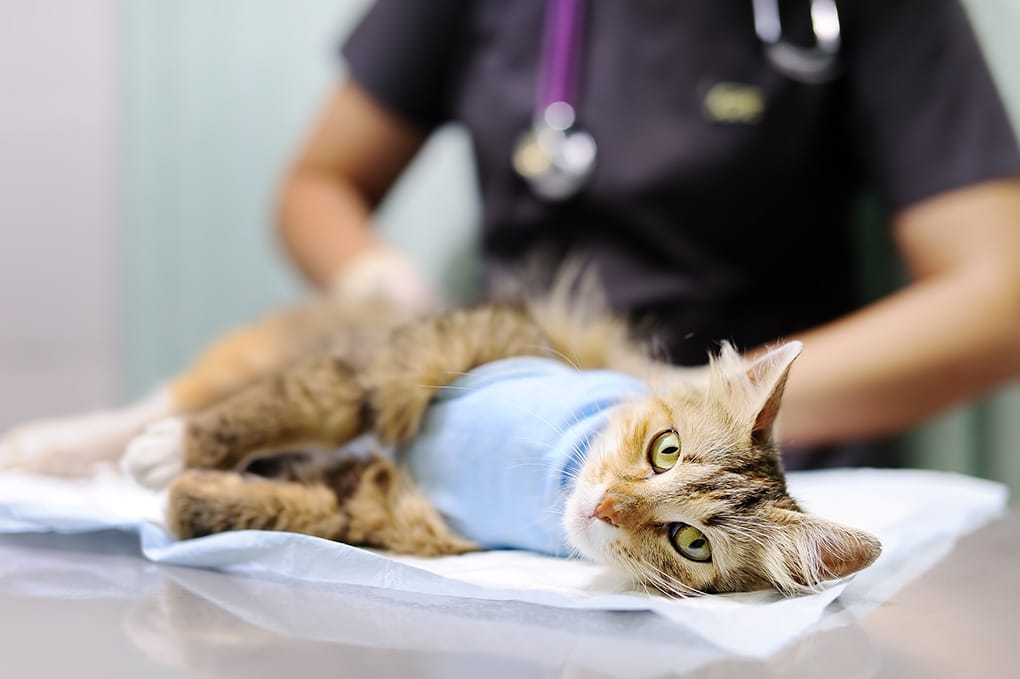General Surgery

Pet Surgery in Mesa, AZ
General surgeries are not uncommon for pets. They can span a range of complexity and needs depending on the pet, their condition, and the situation that brought about the need for the surgery. At East Valley Urgent Pet Care in Mesa, AZ, we offer some surgical options as part of our urgent pet care services.
The Bridge Between Your Family Vet and the Emergency Room
Building Relationships and Giving the Best Quality Medical Options Within Your Family’s Means
Click the Pre-Register button below to speed up your check-in progress
General Surgery for Animals at East Valley Urgent Pet Care
Laceration Repair for pets
Laceration repair is one of the most common general surgeries for domestic pets. This goal is to treat a wound in a pet’s skin to promote healing and prevent infection.
Common Causes of wounds in pets
Pet lacerations can be caused by various factors, including accidents, fights with other animals, bites from insects or snakes, or even sharp objects in the environment. Pets who are very active or spend much time outdoors are more likely to suffer from lacerations.
When Should You See a Vet
Often, the wound is deeper or more serious than it appears on the surface. Even minor lacerations can become infected if left untreated, and more severe lacerations may require immediate attention to prevent excessive blood loss or other complications. Be prepared that some wounds may require multiple treatments and surgeries.
Exploratory Laparotomy in Veterinary Medicine
Exploratory Laparotomy is a surgical procedure commonly performed in veterinary medicine. It involves making an incision into the abdomen to examine and diagnose medical conditions affecting the organs in the belly. This procedure is performed under general anesthesia and can be used to diagnose and treat various medical conditions in animals.
Why would a pet need a laparotomy?
Exploratory Laparotomies are performed on animals for several reasons, including:
- Diagnosis: This procedure can investigate unexplained abdominal pain, vomiting, diarrhea, anorexia, or other clinical signs. By examining or taking a biopsy of the diseased organ, a veterinarian may be able to identify the cause of the problem and recommend an appropriate treatment plan.
- Treatment: Exploratory Laparotomy can remove foreign bodies, bladder stones, and tumors, repair organ damage, or perform other surgical procedures. This procedure can help to improve the quality of life for animals with serious medical conditions.
- Biopsy: During the procedure, a veterinarian can take a tissue sample from one or more abdominal organs for further testing. This can help to diagnose cancer, IBD, liver disease, or other diseases.
Emergency Reproductive Medicine in Pets: Reproductive Surgical Services
There are several reproductive surgical services that may be necessary for certain situations. These services can include:
- Cesarean section: This procedure is performed to deliver puppies or kittens when a female animal cannot give birth naturally. It may be necessary if the animal is experiencing dystocia (difficulty giving birth) or if there are any complications during delivery. This can provide a safer and quicker delivery of the offspring; however the primary goal is to save the mother’s life.
- Spay Surgery (Ovariohysterectomy): This procedure involves removing the ovaries and uterus of female animals. It is typically done to prevent pregnancy and reduce the risk of certain reproductive cancers or infections.
- Neuter Surgery (Orchiectomy): This procedure involves removing the testicles of male animals. It is typically done to prevent pregnancy, reduce the risk of certain reproductive cancers and prostate disease, and control behavioral issues.
- Pyometra surgery: This procedure involves removing the infected uterus of female animals suffering from pyometra, a life-threatening bacterial infection of the uterus. Pyometra can be life-threatening if left untreated. Pyometra surgery can resolve the infection, but the animal will require extensive care before and after surgery.
Each service carries its own risks and benefits. A qualified veterinarian should decide to perform any of these procedures after careful consideration of the animal’s individual health status and medical needs.
Enucleation in Veterinary Medicine
Enucleation is a surgical procedure commonly performed in veterinary medicine that involves the removal of the eye globe and surrounding tissues. This procedure is performed under general anesthesia and can be necessary for certain medical conditions affecting the eye or surrounding tissues.
Why is Enucleation performed on pets?
Enucleation in veterinary medicine is performed for several reasons, including:
- Trauma: Pets may experience trauma to the eye, such as a puncture wound, that cannot be repaired, and enucleation may be necessary to alleviate pain or prevent further complications.
- Neoplastic disease: Tumors affecting the eye or surrounding tissues may require enucleation to remove the cancerous tissue and prevent the spread of cancer.
- Proptosis: In some cases, a pet’s eye may be dislocated from the socket (proptosis) due to trauma, disease or other reasons, and enucleation may be necessary to prevent further injury or infection.
- Uncontrolled pain: In cases where a pet is experiencing uncontrolled pain in the affected eye, enucleation may be recommended to improve their quality of life.

Contact East Valley Urgent Pet Care Today
Pet owners in Mesa, Arizona, need a location where general surgery options are readily available. If your pet needs emergency services, contact us at East Valley Urgent Pet Care today. We offer various surgical services that do not require ongoing 24-hour post-surgical care. Should these types of surgery be needed, we can assist, facilitate, and then arrange for transfer to post-op care facilities.
